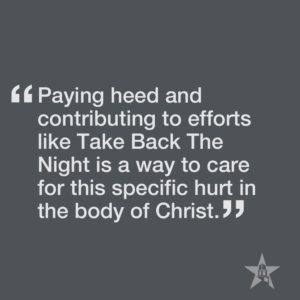As someone who appreciates trigger warnings: *trigger warning* this article acknowledges some realities of sexual violence that might be unsettling to read.
At the beginning of this week, our college joined the efforts of a foundation aiming to end sexual assault, domestic violence, dating violence, sexual abuse, and all other forms of sexual violence. There are millions of sponsors, speakers, members, and volunteers across North America and Europe that facilitate and participate in similar events each year. But honestly, I wouldn’t be surprised if, even immediately after the several events this week, there are people here who don’t know what Take Back The Night really is.
 Even if you think Houghton is a place where sexual violence does not occur, that doesn’t mean it is not an issue here. One in three women worldwide experience some form of sexual violence, with one in six men also experiencing it. A significantly low percentage of victims report these crimes.
Even if you think Houghton is a place where sexual violence does not occur, that doesn’t mean it is not an issue here. One in three women worldwide experience some form of sexual violence, with one in six men also experiencing it. A significantly low percentage of victims report these crimes.
Please take a moment to realize that this means you undeniably know someone who has experienced sexual violence.
Now take another moment to realize the way you act regarding topics of sexual violence, and events like Take Back The Night, matter a lot to approximately one third of all the people you meet. Be it family, friends, roommate, dorm-mate, or classmates, these aren’t just statistics, these are people that you know. If you still think this is an issue of elsewhere, know that just by reading this article, you now know someone who has been affected by this. I endured a season of abuse as a young child in a public daycare centre. I don’t say this to bring sympathy, but to encourage each and every individual here to do what they can to make this campaign against sexual violence matter more. I say it to raise awareness for the millions who’ve received the mark of “victim” and little else. I say it to acknowledge those who have yet to find their voice. I know what a hard journey it can be and it’s important to know you are not alone.
That is why this is an issue at Houghton. Even if it didn’t happen here, people here are trying to walk through that reality in their life. Even in a middle-of-nowhere, Liberal Arts Christian college. Paying heed and contributing to efforts like Take Back The Night is a way to care for this specific hurt in the body of Christ. It tells your sisters and brothers in Christ they should not have to suffer alone. For many, this is not something that happens and then is left in the past, it can seem ever-present and insurmountable. You can equip yourself to reach gently into their isolation as a safe and concerned individual who will give them non-judgemental space to speak if they need to. Even if you can’t fully understand, you can listen. Foundations like Take Back The Night give you the chance to do that.
 A panel on Monday evening provided the opportunity to become more informed, especially regarding the trusted (RA, RD, Professor, Coach, Safety & Security) and confidential (counselor, Dean of Chapel, Title IX Coordinator) employees on campus you can speak to. Tuesday evening hosted a coffeehouse that provided avenues for artistic expression and a chance to listen to one another. On Wednesday, the issue was addressed from the chapel stage and in a faculty lecture. The events concluded with a service and prayer walk. These three days can be overwhelming, but it is important we give what we can toward Take Back The Night’s mission to create safe spaces, understanding relationships, and open communities that seek to end sexual violence and care for those who have experienced it.
A panel on Monday evening provided the opportunity to become more informed, especially regarding the trusted (RA, RD, Professor, Coach, Safety & Security) and confidential (counselor, Dean of Chapel, Title IX Coordinator) employees on campus you can speak to. Tuesday evening hosted a coffeehouse that provided avenues for artistic expression and a chance to listen to one another. On Wednesday, the issue was addressed from the chapel stage and in a faculty lecture. The events concluded with a service and prayer walk. These three days can be overwhelming, but it is important we give what we can toward Take Back The Night’s mission to create safe spaces, understanding relationships, and open communities that seek to end sexual violence and care for those who have experienced it.
When April 2018 comes around, I urge you to be more involved in the events organized by a small group of dedicated students here. And while this year’s events have passed, there is still much you can do. In everyday thoughts and behaviours, you can become known as a safe and accepting person, someone who will listen to another’s hurt and then be sure it is not the only thing you know them by. Do what you can to work against society’s implicit consent to sexual violence and, perhaps most importantly, care for yourself and others with grace, hope, and love.
Colleen is a senior intercultural studies major with a minor in child well-being.
